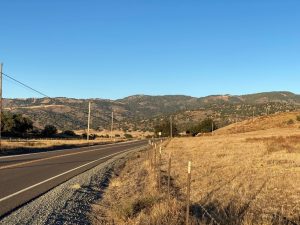
Photo by Jeff Heys, USFS
Roadside ignitions are a significant contributor to wildfires in Southern California. Some invasive plants, such as annual grasses, some perennial grasses, and several broadleaf weed species, are highly ignitable and can carry fire, further increasing wildfire risk. Many roadside vegetation management practices designed to control them are poorly timed to reduce fire risk and weed spread long term. Consequently, they are trapped in an expensive never-ending annual cycle of suboptimal management that is neither sustainable nor effective.
With funding from the National Forest Foundation and the USDA Forest Service, Cal-IPC worked with Williams Ecological Assessments and Planning and On Point Environmental to develop a Durable Ignition Reduction Toolbox (DIRT) for assessing and managing weedy, high fire risk roadside sites in southern California. This Toolbox includes detailed guidance, best management practices, and links to resources for different weed control practices, offers flowcharts to identify appropriate techniques that depend on initial conditions and long-term desired outcomes, and describes different weed treatment scenarios for site managers to investigate further. The Toolbox is designed around three broad alternative long-term outcomes for ignitable, weedy roadsides:
- Enhancing existing desirable ignition-resistant and invasion-resistant native vegetation.
- Site preparation for restoration with desirable vegetation.
- An ignition-resistant roadside surface. This planning guide will provide new alternatives to roadside weed management that target efforts when and where they are needed most while protecting beneficial roadside features of roadsides and ultimately reducing roadside disturbance and unnecessary herbicide use.
Durable Ignition Reduction Toolbox
This manual is available as a free download. Click here to download the Durable Ignition Reduction Toolbox. (81 pp., 2.6 MB)
Contents:
Introduction
Assessing Your Site
Flowcharts
Approaches
Best Management Practices
Annotated Bibliography
Acknowledgements
Funding was provided by the National Forest Foundation and the USDA Forest Service.
Please cite this report as: California Invasive Plant Council, On Point Land Management, and Williams Ecological Assessments and Planning. 2024. Durable Ignition Reduction Toolbox. Cal-IPC Publication 2024-11. California Invasive Plant Council, Berkeley, CA. Available: www.cal-ipc.org.
For more information, contact Cal-IPC.
